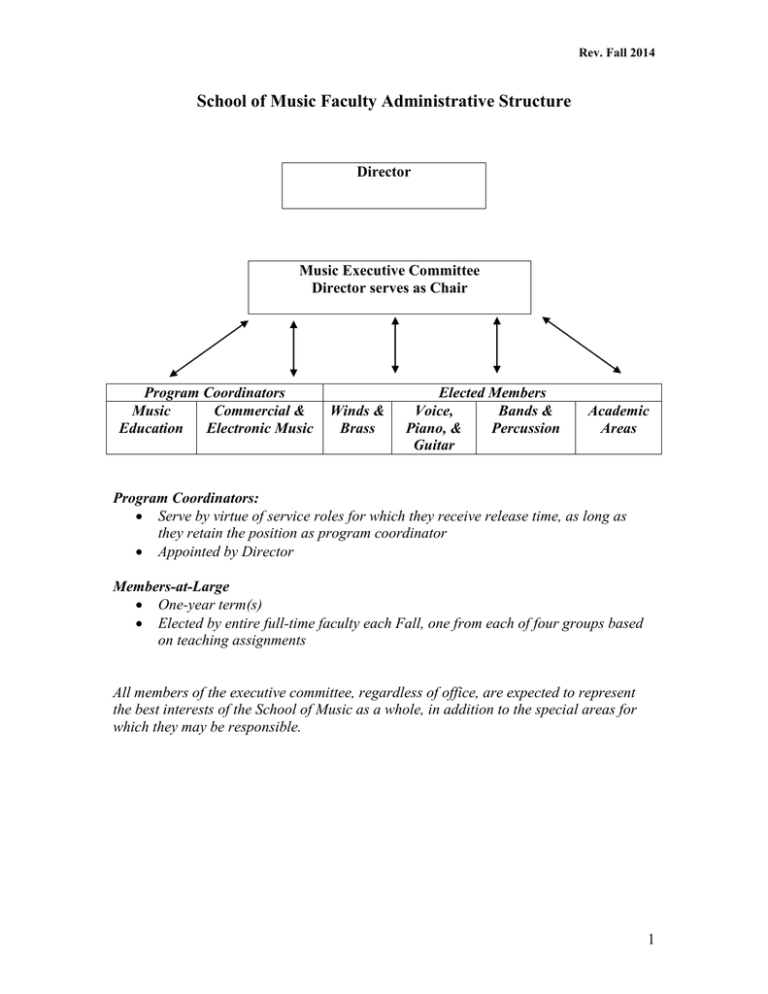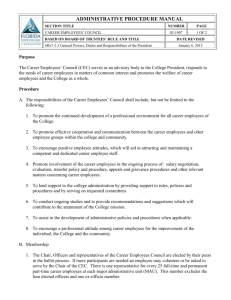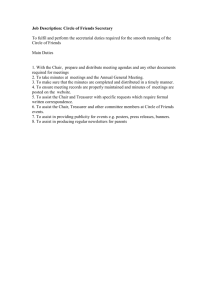School of Music Faculty Administrative Structure
advertisement

Rev. Fall 2014 School of Music Faculty Administrative Structure Director Music Executive Committee Director serves as Chair Program Coordinators Music Commercial & Education Electronic Music Winds & Brass Elected Members Voice, Bands & Piano, & Percussion Guitar Academic Areas Program Coordinators: Serve by virtue of service roles for which they receive release time, as long as they retain the position as program coordinator Appointed by Director Members-at-Large One-year term(s) Elected by entire full-time faculty each Fall, one from each of four groups based on teaching assignments All members of the executive committee, regardless of office, are expected to represent the best interests of the School of Music as a whole, in addition to the special areas for which they may be responsible. 1 Rev. Fall 2014 Responsibilities of Committees Executive Committee Membership: Director (chair), Academic Program Coordinators (2), and Elected Members (4) Elected Members serve one-year terms, and may be re-elected for a maximum of three consecutive terms Assists and advises Director in the operation of the department Receives, considers, and approves proposals for consideration by the faculty Receives, considers, and responds to faculty requests for funding for equipment, travel, guest artists, etc. Proposals for consideration by this committee may come from standing or ad hoc committees, individual faculty, or the department head Meets weekly or at the call of any member of the committee Graduate Advisory Committee (phasing out Spring 2015) Membership: Director (chair), elected representatives of Applied Study, Graduate Core, Music Education, and Commercial & Electronic Music (staggered terms) Meets at least monthly at the call of the Director, who serves ex officio Responsible for all aspects of the graduate programs in music Collegial Review Committee Membership: Six tenured faculty, two elected annually to staggered three-year terms Meets at the call of the Director, who serves ex officio without a vote Considers applications for tenure, promotion, and reappointment Each search committee must include at least one member of the Collegial Review Committee Makes recommendations for revisions to the School of Music Collegial Review Document as necessary Scholarship Committee Membership: Director of Bands, Director of Choral Activities, Representatives of Woodwind, Brass, Voice, and Other studios (4) Meets at the call of the chair or the Director, who serves ex officio Elects its own chair Reviews prior recipients of awards to determine eligibility for renewal Considers all scholarship recommendations received from faculty 2 Rev. Fall 2014 Basic Musicianship Committee Membership: volunteer faculty teaching in music theory, aural skills, history, and literature Meets as necessary at the call of the chair or Director, who serves ex officio Coordinates the academic areas of the Music Core Forms subcommittees as necessary to review and select textbooks, supporting materials, and teaching strategies for specific courses Applied Music Committee Membership: One representative from each performance area (brass, woodwind, voice, keyboard, percussion, and strings) selected by each group of studios (elects its own chair) Meets as necessary at the call of the chair or Director, who serves ex officio Monitors the evaluation of student performance in juries, exams, hearings, and recitals Faculty with Supervisory Duties In addition to the standing committees of the departments, some faculty have supervisory duties. These duties may or may not involve a reduction in teaching load. Duties for which a load reduction is given are expected to involve a commitment of time considerably beyond what would be expected if done as “service to the university.” As a general guideline, these responsibilities may involve 3-4 hours of student contact, rehearsal, and/or office work per week per hour of release time given. Duties for which a teaching load reduction is given do not satisfy the expectation of voluntary “service” as a matter of good faculty citizenship in matters of tenure, promotion, or reappointment. Faculty Supervisors may bring concerns and proposals to the appropriate Program Coordinators, Area Representatives, the Director, or to the Executive Committee as necessary. Liaisons: Friends of the Arts, Library, LCE, etc. Maintenance: Percussion Equipment; Electronic Classroom and Teaching Carts; CAT Performance: Accompanying for Student Recitals; Director of Bands; Director of Choral Activities; Scheduling of Student Recitals, etc. Publications: Recruiting Materials; Fine Arts Calendar; Rondo Editor; Webmaster Student organizations with Faculty Advisors: Music Educators National Conference; Kappa Kappa Psi; Phi Mu Alpha; Sigma Alpha Iota; Flute Society, etc. 3


